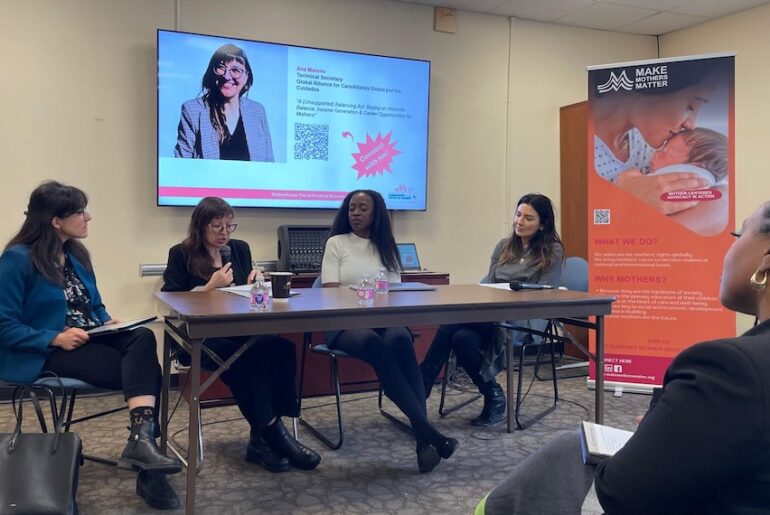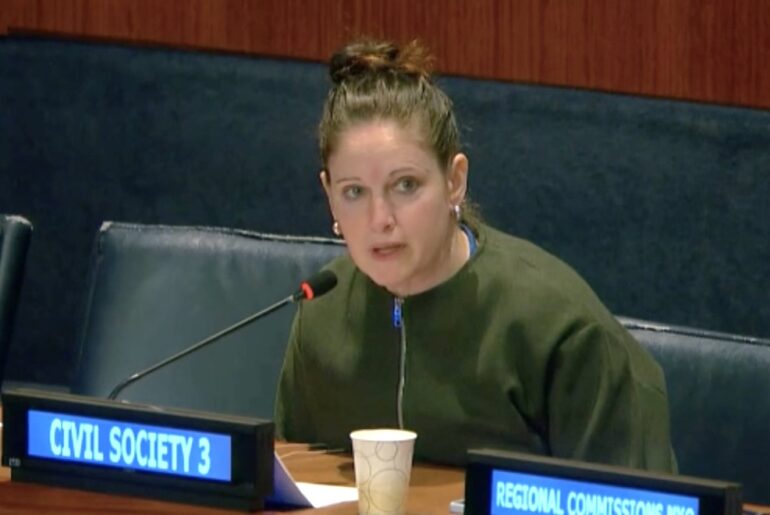For mothers to access decent work we must recognize and redistribute unpaid care work
03.01.23
UN New York, Commission on Social Development (CSoCD61) - In our written statement submitted ahead of this year's Commission, MMM points to the inequitable distribution of unpaid family care work as the root cause of the 'motherhood penalty' - covering all the discriminations and obstacles that women face when accessing and participating in the labour market when they are mothers.
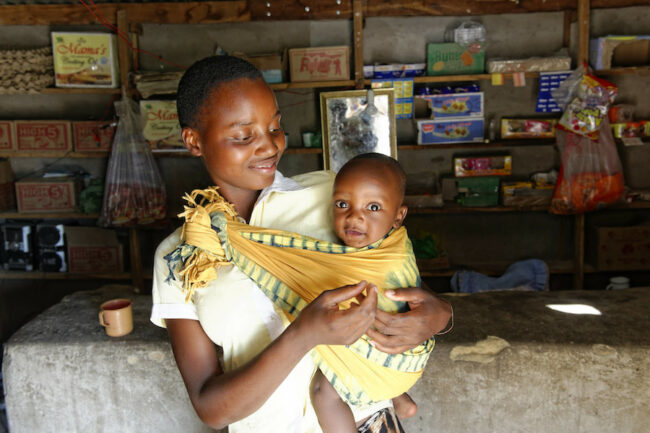
The following is the full text of our statement, Mothers and decent work
Statistics show that women are more often discriminated against in the world of work than men. These inequalities are exacerbated for mothers. Indeed, they remain the main person responsible for unpaid domestic and care work, and have to juggle family life with paid work, all too often paying a price for assuming these multiple roles.
What is the current situation for mothers in the world of work?
- Discrimination in accessing the labour force, promotion and career development
- More precarious contracts, more part-time work as compared to other groups of people
- Jobs in low-value sectors of activity (cleaning, catering, manual production work, etc.)
- Lower pay for work of equal value or equal skills – for example, in France, while the wage difference between men and women without children is estimated at 0.4%, the wage difference between a man and a woman with at least one child jumps to 12.4%; this pattern, although variable in its proportions, can be observed in all European countries
- High rate of informal work and therefore no social protection coverage
What are the particular obstacles related to pregnancy, childcare responsibilities and domestic work?
- A disproportionate share of unpaid family care work (globally more than 76% of unpaid domestic work in the home is done by women), which is at the root of gender inequalities
- A lack of childcare facilities for young children, and/or their cost, which are a barrier to employment
- The need to reduce working hours to accommodate childcare and schooling
- Lack of education and professional skills following early drop-out of school due to early pregnancies
These work challenges, the inability to get a proper pay, and the need to balance family and professional life are particularly acute for single mothers – a situation which is increasingly prevalent, for a variety of reasons: a partner leaving home because of conflict or the necessity to find a job in another region or another country, widowhood, etc.). In the Kibera ghetto in Kenya – East Africa, for example, 60% of the mothers interviewed said they no longer had a partner at home.
The Covid-19 pandemic has exacerbated the ‘motherhood penalty’ on the labour market, and thrown many out of the labour force and into a situation of poverty. Many mothers have been forced to quit their jobs having had to face the closure of schools and childcare facilities. The slowdown in the global economy has also resulted in a loss of jobs where women are over-represented (cleaning, hotel and catering, and to a lesser extent, manufacturing).
Covid-19 has also heightened the gap between advanced economies- that have benefited from generous public support policies, and where people could be vaccinated – and developing countries.
In addition, recent conflicts and the current economic and environmental crises have increased the cost of living for families, and reduced access to basic necessities, leading to a general increase in poverty levels. Access to a second decent wage in the home has become ever more necessary – also in view of growing job insecurities.
Recognizing unpaid care work
Reducing inequalities, in particular gender inequalities, requires us to address the issue of the inequitable distribution of the unpaid work of caring for dependent members of families, beginning with children. Reducing inequalities means recognizing unpaid family care work as work in its own right, a work that is essential for the functioning of the economy and society.
The ILO has recognized unpaid care work as work that should be measured as part of labour statistics. Its measurement is part of the 2030 UN development agenda, target 5.4. To date, many States have yet to conduct the necessary time-use surveys and integrate this indicator into their statistics.
Recognizing the value and essential nature of unpaid care work, and framing it as a collective responsibility will foster the implementation of supporting policies, appropriate public investments, and compensation measures for those who have to do it.
Redistributing unpaid care work
All over the world, the vast majority of unpaid care work falls on the shoulders of mothers. Recognizing this work can support the right of mothers to make life choices and fulfill their personal aspirations – to choose to take time out from the labour market to stay at home and care for their children, or to work full-time or part-time as they wish.
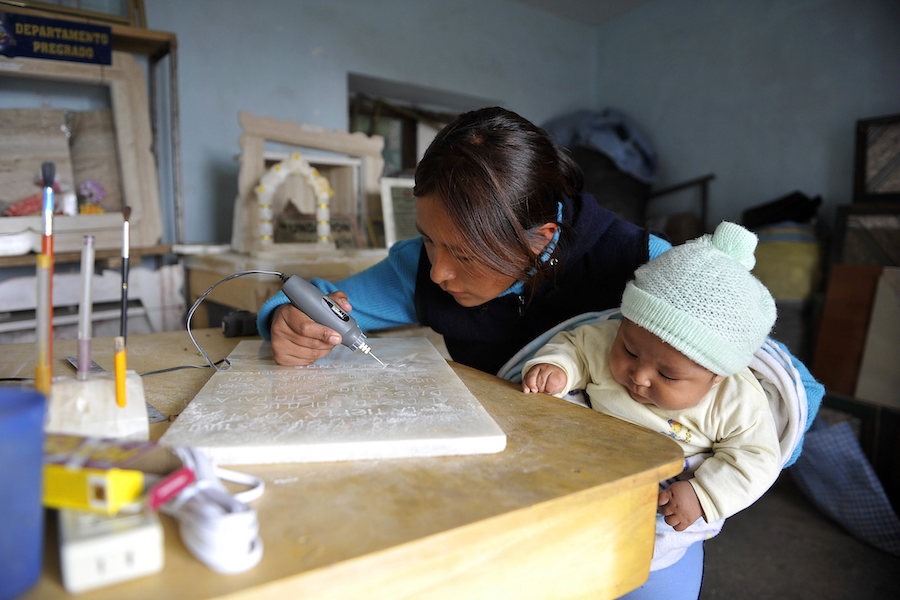
To achieve this goal, a more equitable sharing of care responsibilities is essential, not just between men and women, but also across society:
- Unpaid care work should first be more equitably shared within the family, between men and women: in particular, fathers must be made aware of their role and engaged to take on some of the care responsibilities and domestic tasks at home. States can put in place information and incentive policies. This must of course be done at a pace adapted to each country and its culture
- Governments have a key role: in addition to supportive social policy, they must at every level invest in appropriate public infrastructures and services that reduce the time needed to perform domestic and care work which in turn can contribute to empower women: water, electricity, energy, telecommunications, but also lifelong learning, childcare, transport, health services, etc.
- The private sector is also a key stakeholder and companies must take their share of responsibility: they must develop and implement policies that support workers with caregiving responsibilities, in particular mothers when they return from maternity leave. In addition, they must support flexible working conditions compatible with childcare and family life, i.e. flexible working hours, voluntary part-time work, breaks for breastfeeding, progressive training courses or adapted career paths. Private companies themselves increasingly see the advantages of such policies, also from a business point of view: employee retention and motivation, increased productivity, etc. An increasing number of organisations also recognize that the time that parents take off work to care for their children is not lost, but actually helps them develop skills, soft skills in particular, that are also of great value at work.
Universal social protection
A social protection floor disconnected from formal employment is essential to reduce gender inequality and poverty, and to give women a minimum level of security so that they can organise their professional activity in tandem with their role as mothers.
Social protection, beginning with maternity protection, should in particular be provided to women both during pregnancy and when they are bringing up their children. It can take the form of allowances or services made available to mothers.
Improving childcare solutions
For all mothers across the world, one of the main obstacles to access decent work or training/higher education is the lack of affordable and convenient high-quality childcare solutions – day care for young children and after school care for older children.
In order to support the empowerment of women, it is therefore necessary to:
- Develop a diversified and accessible childcare offering (allowing families to choose between crèches, nannies, shared care, etc.)
- Allow parents to look after their children themselves through the creation of childcare allowances, accessible to both fathers and mothers
- Adapt childcare costs to household income – States should consider making childcare completely free for the poorest mothers, especially single mothers
Promoting lifelong learning
Pregnancy and childcare have consequences for mothers in terms of the skills they develop, the quality and type of jobs they can do, and career development.
Indeed, in many low and middle-income countries, the age of first pregnancy leads to a de-schooling of the girl who cannot pursue further education and acquire advanced vocational skills. According to the Population Division of UN DESA, each year more than 21 million young women worldwide become pregnant between the ages of 15 and 18, and 777,000 give birth to a child before the age of 15, resulting in immediate school drop-out, when they had the chance to still be in school. This confines them to future jobs that are poorly paid, are often informal, and do not match their aspirations.
On the other hand, some mothers will accept jobs with less responsibility and reduced working hours in order to meet the demands of family life and care responsibilities. These mothers must be given the opportunity to bounce back when they have the chance. This requires access to adult vocational training, and lifelong learning systems, which can be arranged in specific structures such as universities or associations, or within companies themselves.
Supporting women entrepreneurship
One of the solutions that enables a mother to combine family constraints with professional life is to become an entrepreneur – hence the ‘mompreneurs’ phenomenon. Setting up their own business allows women to control their working hours and organisation. This is true in both developed and developing countries. Globally, the country with the most female-led businesses is Uganda. In a country like France, in 2018 56% of microenterprises were created by women. Women entrepreneurship therefore contributes to the empowerment of mothers, gender equality and job creation.
In Kibera, for example, 28% of the mothers surveyed want to start their own business. The main obstacle is the lack of initial capital to invest in the necessary equipment. They also expressed the need to be accompanied at the start by a mentor or a support structure.
MMM Recommendations
Supporting mothers means supporting children and future generations. This is a fundamental responsibility of States. But it also means supporting a whole dynamic of women motivated to work and participate in the economic and social development of their country.
In order to enable mothers to have access to decent jobs that meet their life aspirations, to reduce the motherhood penalty and maternal poverty, and more generally progress on gender equality, Make Mothers Matter calls upon governments to:
- Promote a fairer distribution of unpaid care work within families, through:
– National information campaigns, supported by governments to promote the sharing of domestic and care work between men and women
– Support for grassroots associations that promote these messages - Recognize unpaid care work as work, an indispensable contribution to a country’s economy and society, which like any other economic activity must be measured and appear in labour statistics
- Provide a universal basic social security coverage for all mothers, at least from the time of pregnancy and for as long as the children are dependent. In particular, this should include sufficient paid maternity leave so that a child of a few months does not have to be separated from their mother if either is not ready
- Develop and fund affordable high-quality childcare systems that allow families to choose from different childcare options that best suits them
- Provide lifelong vocational training programmes for women, in particular mothers. This can be done through assistance to grassroots associations that organise such training or the development of public learning structures, as well as financial support or scholarships to enable women to enroll in these courses
- Support women entrepreneurship through:
– training in business creation and management
– support structures for women business creators
– credits and micro-credits to launch their activity
– communication tools and mentorship systems to develop their activity
![]() MMM statement for download (version with references)
MMM statement for download (version with references)
![]() MMM statement as UN Document E/CN.5/2023/NGO/52
MMM statement as UN Document E/CN.5/2023/NGO/52
This Statement was supported by International Presentation Association, Red Dot Foundation, Rozaria Memorial Trust (Zimbabwe), Soroptimist International, Soroptimist International Great Britain and Ireland, Women’s Federation For World Peace International.
The 61st session of the UN Commission on Social Development will take place from 6 to 15 February 2023 at the UN in New York. Its main theme is ‘Creating full and productive employment and decent work for all as a way of overcoming inequalities to accelerate the recovery from the COVID-19 pandemic and the full implementation of the 2030 Agenda for Sustainable Development’.
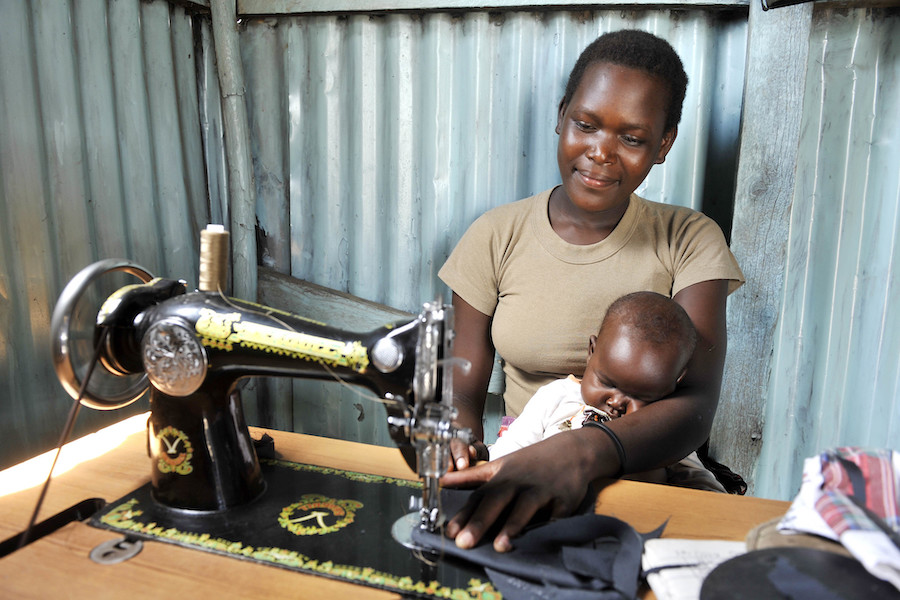
All pictures © Marcel Crozet – ILO
Time Poverty and the Motherhood Penalty
Unveiling Economic and Social Injustices
09.07.24
Mothers play an essential role in families by ensuring their loved ones are nourished, educated, and healthy, but their unpaid care work often leads to economic and social injustices, known
Envisioning care as a common thread to global crises
29.07.24
UN New York - Our virtual HLPF side-event brought together experts to shed light on how the various global crises we face (in particular climate change and other environmental crises,
We call for multi-stakeholder approach to recognise and support unpaid care work
21.07.24
UN New York - Participating in the meeting of the UN Economic and Social Council (ECOSOC) on care and support systems, MMM reaffirmed the principle of co-responsibility, which should underpin






